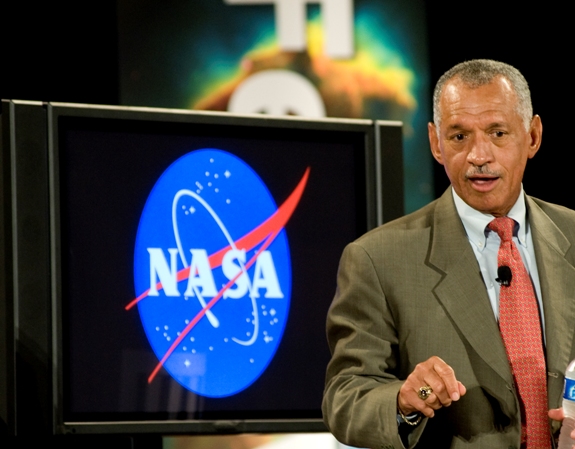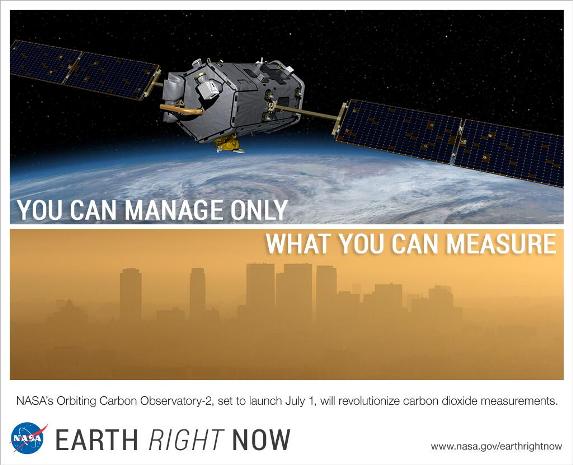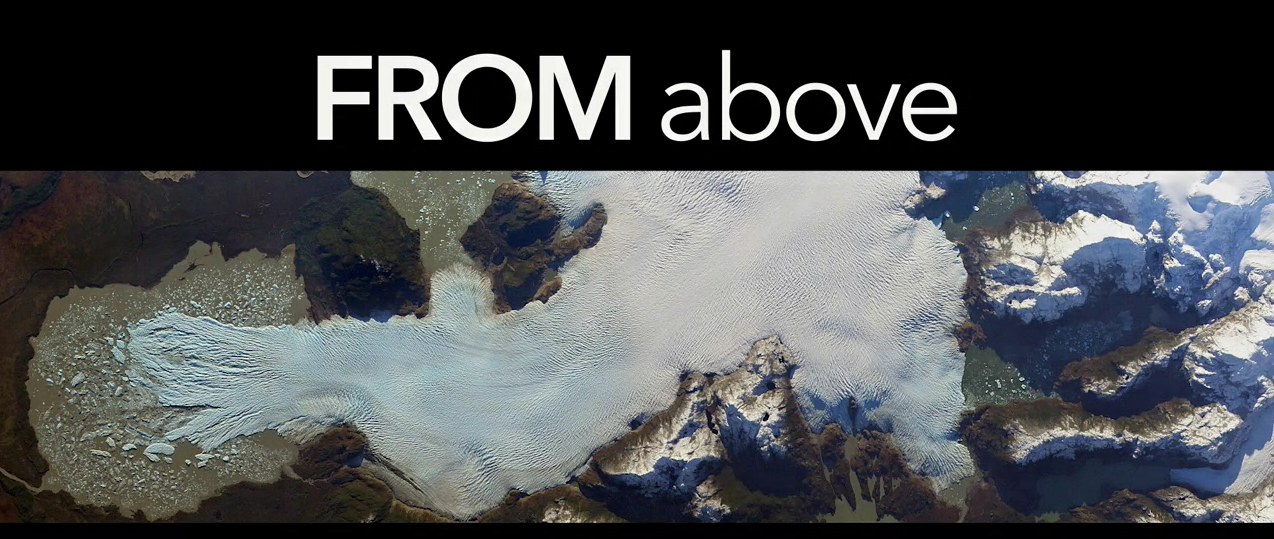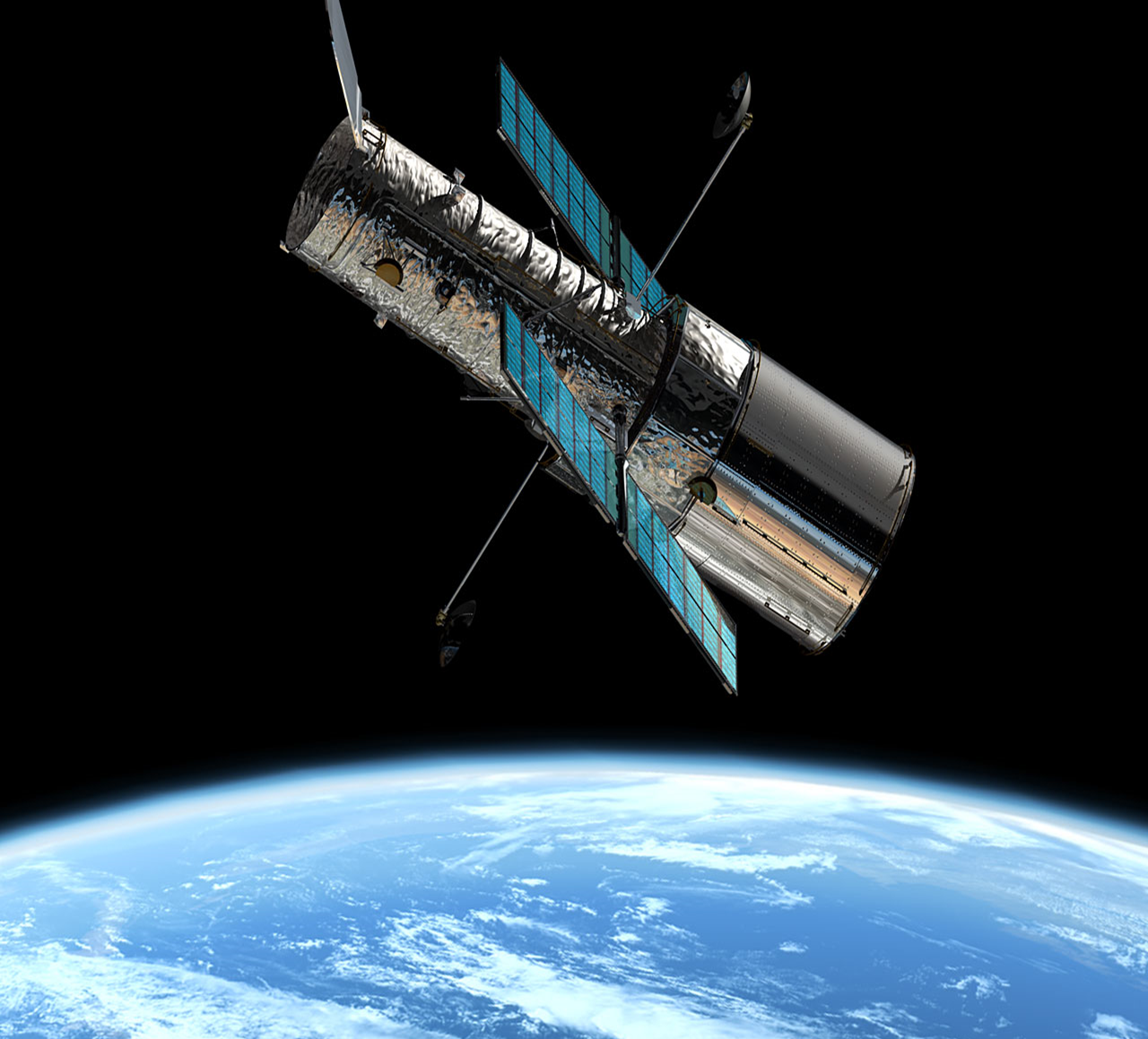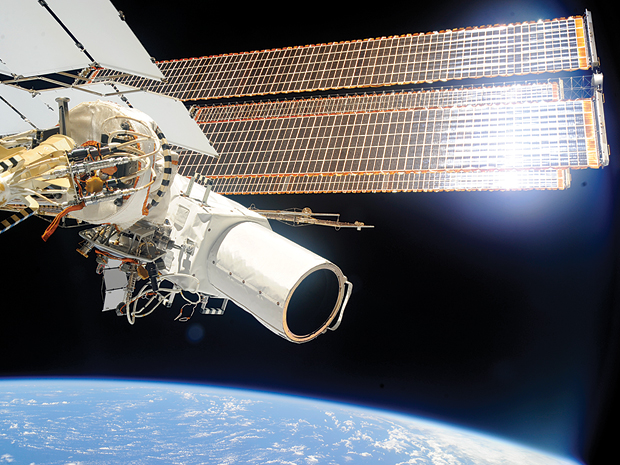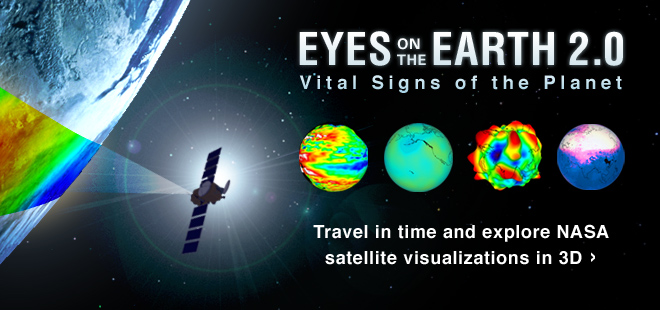Earth and Space, Politics: Difference between revisions
Siterunner (talk | contribs) No edit summary |
Siterunner (talk | contribs) No edit summary |
||
| Line 5: | Line 5: | ||
From GreenPolicy360: The Congressional faction looking to hobble Earth-Science-research-from-space sends their first shot across the bow. The denialists and anti-science factions do not want to face the data from a new fleet of NASA Earth monitoring satellites. The security threat environment, by most all credible sci, is accelerating fast, yet these politicos want to cover the eyes of this generation's reporting of, as NASA calls it, [http://www.greenpolicy360.net/w/File:Vital_Signs,_Taking_the_Pulse_of_the_Planet_Sept2014.png '''"Earth's Vital Signs"''']. The scientific data tracking Earth's systems is overdue, is essential, and should be continued and expanded not radically cut... | From GreenPolicy360: The Congressional faction looking to hobble Earth-Science-research-from-space sends their first shot across the bow. The denialists and anti-science factions do not want to face the data from a new fleet of NASA Earth monitoring satellites. The security threat environment, by most all credible sci, is accelerating fast, yet these politicos want to cover the eyes of this generation's reporting of, as NASA calls it, [http://www.greenpolicy360.net/w/File:Vital_Signs,_Taking_the_Pulse_of_the_Planet_Sept2014.png '''"Earth's Vital Signs"''']. The scientific data tracking Earth's systems is overdue, is essential, and should be continued and expanded not radically cut... | ||
[http://www.greenpolicy360.net/w/Category:Environmental_Security ''Re:Environmental Security''] | ○ ○ ○ ○ | ||
[http://www.greenpolicy360.net/w/Category:Environmental_Security ''Re: Environmental Security''] | |||
Revision as of 17:36, 1 May 2015
Update: April 24, 2015
House budget authorization mark-up slashes $500 million from NASA’s Earth science programs
From GreenPolicy360: The Congressional faction looking to hobble Earth-Science-research-from-space sends their first shot across the bow. The denialists and anti-science factions do not want to face the data from a new fleet of NASA Earth monitoring satellites. The security threat environment, by most all credible sci, is accelerating fast, yet these politicos want to cover the eyes of this generation's reporting of, as NASA calls it, "Earth's Vital Signs". The scientific data tracking Earth's systems is overdue, is essential, and should be continued and expanded not radically cut...
○ ○ ○ ○
-=-=-=-=-=-=-=-=-=-=-=-=-=-=-=-=-=-=-=-=-=-=-=-=-=-=-=-=-=-=-=-=-=-=-=-=-=-=-=-=-=-=-=-=-=-=-=-=-=-=-
The current debate in the United States Congress is highlighted by voices who would set aside the consensus of the scientific community and cut back budgets for Earth Science studies from space. The recent launches of a fleet of new NASA satellites and related missions to acquire critical data of Earth systems is now threatened by politicians who profess they are "not scientists" and, as a result, cannot speak to the validity of human-caused impacts and threats to natural systems. The vantage point of space offers a unique platform for risk assessment, studying and monitoring Earth's systems over time and, hopefully, better managing the well-being and sustainability of critical systems. Those who undercut the environmental and national security of these missions should be questioned and challenged.
GreenPolicy360 will continue to track the positions and responses of politicians in countries around the globe with an emphasis on those with existing earth-space programs.
Here, a newly appointed chairperson, of a US Senate committee with oversight powers claims to know what "inspires" children and feels he has a handle on what is important for the future. It's not a focus on the well-being of the Earth and scientific studies now beginning in earnest to confront a host of challenges but rather Senator Cruz from Texas brings evangelical zeal in his beliefs and professions that the future is "infinity and beyond."
Cruz versus Bolden
March 12, 2015
Texas Senator Ted Cruz: "More Space, Less Earth"
Ted Cruz Tells NASA to Stop Worrying About Climate Change and Focus on Space
The Texas Republican and likely presidential candidate told NASA’s chief administrator, Charles Bolden, on Thursday to focus on “what inspires little boys and little girls across this country.”
Ted Cruz and Charles Bolden would probably agree that the core of the Earth is a mass of molten metal as hot as the sun. But as for the core of NASA's mission, the senator from Texas and the former astronaut split ways.
Since taking the chairmanship of the Senate Space, Science, and Competitiveness Subcommittee this year, Cruz has been pushing the agency to adopt a "more space, less Earth" strategy. The Republican lawmaker argues that the Obama administration is wrongfully neglecting the country's space exploration operations—like potential missions to Mars and beyond—in favor of global-warming research. And he wants to know if Bolden, NASA's administrator, thinks so, too.
"I'd like to start by asking a general question," said Cruz on Thursday during a subcommittee hearing on the president's $18.5 billion budget request for NASA for fiscal 2016, which allocates considerable funding for Earth- and ocean-science projects. "In your judgment, what is the core mission of NASA?"
Bolden said he'd been contemplating that mission over the past few days, and had read over the National Aeronautics and Space Act of 1958, which created the agency. "Our core mission from the very beginning has been to investigate, explore space and the Earth environment, and to help us make this place a better place," he said, adding that the study of aeronautics is important as well.
Cruz didn't seem pleased with the "Earth environment" part of Bolden's answer. "Almost any American would agree that the core function of NASA is to explore space," he said. "That's what inspires little boys and little girls across this country ... and you know that I am concerned that NASA in the current environment has lost its full focus on that core mission."
Cruz then pointed to a chart behind him titled "Focus Inward or Focus Outward? Refocusing NASA's Core Priorities" that compared NASA's budget in 2009 with the current request. He said that since 2009, funding for Earth sciences has seen a 41 percent increase, while funding for exploration and space operations, what Cruz "would consider the core function of NASA," has seen a 7.6 percent decrease.
"In my judgment, this does not represent a fair or appropriate allocation of resources, that it is shifting resources away from the core functions of NASA to other functions," Cruz said. "Do you share that assessment?"
Bolden, who decides how to allocate NASA's annual budget, did not. That dip in space exploration funding? That was kind of the whole point. "Mr. Chairman, I am very interested in your chart," he said. "I will say one thing—it is interesting to note that there is a decrease in exploration and human spaceflight when, in fact, that was somewhat intentional because we were trying to get the cost of exploration down as we reach farther out into the solar system."
Bolden said the now-defunct space shuttles cost NASA $2 billion a year to maintain whether they flew or not. Today, NASA has a $6.6 billion contract with private companies Boeing and SpaceX that will provide for 16 human spaceflights over a span of three to four years.
"So I think the decrease is actually a little bit of what we're trying to do to get the cost of flying humans into space down," he told Cruz. "That's what's driving the market, is reducing launch costs."
More money for Earth-science research is a good thing, he continued. "The fact that Earth-science has increased—I'm proud to say that it has enabled us to understand our planet far better than we ever did before," Bolden said.
The NASA chief distanced himself from Cruz's assessment of spending changes within the agency.
You asked me about your chart. There's a lot of chartsmanship," Bolden said, chuckling. "I'm not sure what you include in 'exploration,' for example. So, by my statement, I was not acknowledging that I agree with the numbers on the chart. I don't want everyone to say I accept the numbers on the chart."
The exchange offered a glimpse of NASA under a potential Cruz presidency. Climate-change researchers let out an audible groan when Cruz, who is expected to run in 2016, took the helm of the Senate subcommittee overseeing the federal agency in January. Cruz's views—especially his belief that global warming doesn't exist—are at odds with NASA's extensive climate-science programs, which study solar activity, sea level rise, and oceanic temperatures, to name a few. On Thursday, Bolden appeared to hope the senator's opinions wouldn't get in the way of how NASA spends its money.
"We can't go anywhere if the Kennedy Space Center goes underwater and we don't know it—and that's understanding our environment," Bolden said, alluding to the risk that climate change poses to the low-elevation state of Florida. "It is absolutely critical that we understand Earth environment because this is the only place that we have to live."
-=-=-=-=-=-=-=-=-=-=-=-=-=-=-=-=-=-=-=-=-
One Senator's priorities:
The Cruz mission: More Space, Less Earth
... In Cruz's mind, President Obama has spent too much of the agency's resources studying the planet we already inhabit, rather than focusing its missions on the "infinity and beyond" objectives that have the potential to captivate Americans.
For Cruz to rewrite NASA's objectives, he'd need the approval of his subcommittee, votes in the full Senate and House, and Obama's signature. Even for someone used to fighting long legislative odds, it's likely Cruz's role will be less about principled showdowns over must-pass legislation and more about shining a spotlight on perceived priorities.
Last year, NASA launched five new missions to study Earth's climate, and Earth science missions currently occupy about 10 percent of NASA's budget. Cruz believes that has come at the expense of "the core mission of NASA, manned space exploration."
"There are tremendous opportunities for commercial space," Cruz says. "One of the very first focuses of the subcommittee will be on expanding those opportunities, expanding how we can allow the private sector to create jobs, to create growth, and how we can explore new frontiers in space."
Those in the commercial space industry believe Cruz recognizes their potential. "We're seeing a well-diversified commercial renaissance in Texas. That's something that philosophically the senator feels good about," said NanoRacks co-founder Jeffrey Manber. His company contracts with NASA to provide computer-lab space and small satellite launches from ISS.
-=-=-=-=-=-=-=-=-=-=-=-=-=-=-=-=-=-=-=-=-
GreenPolicy360: Of course, the data demonstrates that much of NASA's work based in Texas, as the Texas Senator is aware, brings benefits to Texas, economic benefits and incalculable benefits beyond the state of Texas -- NASA has led the world's scientific efforts to study space and Earth's unique life-giving systems in space.
The field of "New Space", extending beyond first-generation space/earth science and continuing NASA missions with economies, is building a fast-growing vital industry in cooperation with NASA. New Space extends the mission of the US space program as multiple start-up companies supply NASA missions and launch micro-satellites and remote sensing services and Internet distributed products and information across a wide spectrum of business, natural resources, science and critical environmental fields. Over the past several years, the venture capital market has hurried to support these start-ups, as the international business potential has become evident. One company as an example of many NASA-space, earth-science related companies in Texas is NanoRacks, deploying next-gen satellites from the ISS. The Texas "New Space" NASA-related business focus on deploying earth-facing, earth-science satellites is poised to become a worldwide industry.
In the space industry data from space when verified is typically referred to as a "ground truth."
The truth is that the Texas component of visionary space-based, earth-science NASA missions involves billions of dollars in commercial space work grouped around NASA -- perhaps the truth of this financial early-stage growth and potential for worldwide applications will catch the ears of the Senator...
-=-=-=-=-=-=-=-=-=-=-=-=-=-=-=-=-=-=-=-=-
March 12/13/14, 2015
“Virtually all academic planetary scientists are in earth science departments, because the Earth, after all, is a planet,” says Margaret Leinen, president of the American Geophysical Union (AGU) and a former head of the National Science Foundation’s geosciences directorate. “Of course the geosciences are part of the hard sciences,” explains Leinen, head of the Scripps Institution of Oceanography and vice chancellor for marine sciences at the University of California, San Diego. “They provide us with very fundamental knowledge about the way the planet works, knowledge grounded in the physical sciences.”
http://mashable.com/2015/03/12/ted-cruz-nasa-earth-science-attack/
http://sciencepolicy.agu.org/files/2013/07/AGU-letter-to-Sen-Cruz-March-2015.pdf
http://thinkprogress.org/climate/2015/03/13/3633354/ted-cruz-nasa-mission/
http://stgist.com/2015/03/gop-sen-ted-cruz-nasa-funding-climate-change-topic-1840
http://www.ibtimes.com/ted-cruz-wants-nasa-focus-deep-space-missions-instead-studying-earth-1847112
http://www.bloomberg.com/politics/articles/2015-03-13/ted-cruz-loves-nasa-but-there-s-a-catch
_________________________________________________
Beyond the questions of the existential importance of space/earth study are questions of 'deep space' manned flight...
Cost and Benefits -- a Manned Space Backgrounder, 2008
Is Space Exploration Worth the Cost?
What follows is a long blog post, and it will at times require your close attention. But I believe it is easily one of the best quorums we’ve ever published here. I’d like to thank all the participants for their thoughtful, well-considered, and fascinating answers, and for taking the time to share their very considerable expertise and experience.
Pretend that instead of being responsible for your household budget, which means paying for rent or a mortgage, transportation, some schooling costs, groceries, healthcare, vacation, etc., you are instead responsible for a considerably larger budget that provides a variety of services for about 300 million people including the maintenance of an army, protecting the borders, etc. In other words, pretend you are responsible for the U.S. Federal budget. And now ask yourself how much of that money you want to spend on manned space travel, and why.
A group of space authorities — G. Scott Hubbard, Joan Vernikos, Kathleen M. Connell, Keith Cowing, and David M. Livingston, and John M. Logsdon — were asked the following:
Is manned space exploration worth the cost? Why or why not?
Highlights from their responses:
Logsdon on a not-so-obvious incentive for manned space travel: “Space exploration can also serve as a stimulus for children to enter the fields of science and engineering.”
Vernikos on the R.O.I. of space travel: “Economic, scientific and technological returns of space exploration have far exceeded the investment. … Royalties on NASA patents and licenses currently go directly to the U.S. Treasury, not back to NASA.”
Cowing on space expenditures relative to other costs: “Right now, all of America’s human space flight programs cost around $7 billion a year. That’s pennies per person per day. In 2006, according to the USDA, Americans spent more than $154 billion on alcohol. We spend around $10 billion a month in Iraq. And so on.”
§
G. Scott Hubbard, professor of Aeronautics and Astronautics at Stanford University, editor of [File:NewSpace March 2015 top article first page Hubbard.png "New Space" magazine], and former director of the NASA Ames Research Center:
The debate about the relative merits of exploring space with humans and robots is as old as the space program itself. Werner Von Braun, a moving force behind the Apollo Program that sent humans to the moon and the architect of the mighty Saturn V rocket, believed passionately in the value of human exploration — especially when it meant beating the hated Soviet Empire. James Van Allen, discoverer of the magnetic fields that bear his name, was equally ardent and vocal about the value of robotic exploration.
There are five arguments that are advanced in any discussion about the utility of space exploration and the roles of humans and robots. Those arguments, in roughly ascending order of advocate support, are the following:
1. Space exploration will eventually allow us to establish a human civilization on another world (e.g., Mars) as a hedge against the type of catastrophe that wiped out the dinosaurs.
2. We explore space and create important new technologies to advance our economy. It is true that, for every dollar we spend on the space program, the U.S. economy receives about $8 of economic benefit. Space exploration can also serve as a stimulus for children to enter the fields of science and engineering.
3. Space exploration in an international context offers a peaceful cooperative venue that is a valuable alternative to nation state hostilities. One can look at the International Space Station and marvel that the former Soviet Union and the U.S. are now active partners. International cooperation is also a way to reduce costs.
4. National prestige requires that the U.S. continue to be a leader in space, and that includes human exploration. History tells us that great civilizations dare not abandon exploration.
5. Exploration of space will provide humanity with an answer to the most fundamental questions: Are we alone? Are there other forms of life beside those on Earth?
It is these last two arguments that are the most compelling to me. It is challenging to make the case that humans are necessary to the type of scientific exploration that may bring evidence of life on another world. There are strong arguments on both sides. Personally, I think humans will be better at unstructured environment exploration than any existing robot for a very long time.
There are those who say that exploration with humans is simply too expensive for the return we receive. However, I cannot imagine any U.S. President announcing that we are abandoning space exploration with humans and leaving it to the Chinese, Russians, Indians, Japanese or any other group. I can imagine the U.S. engaging in much more expansive international cooperation.
Humans will be exploring space. The challenge is to be sure that they accomplish meaningful exploration.
§
Joan Vernikos, member of the Space Studies Board of the National Academy and former director of NASA’s Life Sciences Division:
Why explore? Asked why he kept trying to climb Everest, English mountaineer George Mallory reputedly replied, “Because it was there.” Exploration is intrinsic to our nature. It is the contest between man and nature mixed with the primal desire to conquer. It fuels curiosity, inspiration and creativity. The human spirit seeks to discover the unknown, and in the process explore the physical and psychological potential of human endurance.
There have always been the few risk-takers who ventured for the rest of us to follow. Because of earlier pioneers, air travel is now commonplace, and space travel for all is just around the corner. Economic and societal benefits are not immediately evident, but they always follow, as does our understanding of human potential to overcome challenges. Fifty years after Sputnik, space remains the next frontier.
Without risking human lives, robotic technology such as unmanned missions, probes, observatories, and landers enables space exploration. It lays the groundwork, and does the scouting. But as I heard former astronaut Thomas Jones often say, “only a human can experience what being in space feels like, and only a human can communicate this to others.” It is humans who repair the Hubble telescope. It is humans who service the International Space Station (ISS). Mercury astronauts were the first to photograph Earth from space with hand-held cameras. Earth scientists in orbit on the ISS may view aspects of global change that only a trained eye can see. In addition, studying astronauts in the microgravity of space has been the only means of understanding how gravity affects human development and health here on Earth. It is highly probable that, in this century, humans will settle on other planets. Our ability to explore and sustain human presence there will not only expand Earth’s access to mineral resources but, should the need arise, provide alternative habitats for humanity’s survival.
At what cost? Is there a price to inspiration and creativity? Economic, scientific and technological returns of space exploration have far exceeded the investment. Globally, 43 countries now have their own observing or communication satellites in Earth orbit. Observing Earth has provided G.P.S., meteorological forecasts, predictions and management of hurricanes and other natural disasters, and global monitoring of the environment, as well as surveillance and intelligence. Satellite communications have changed life and business practices with computer operations, cell phones, global banking, and TV. Studying humans living in the microgravity of space has expanded our understanding of osteoporosis and balance disorders, and has led to new treatments. Wealth-generating medical devices and instrumentation such as digital mammography and outpatient breast biopsy procedures and the application of telemedicine to emergency care are but a few of the social and economic benefits of manned exploration that we take for granted.
Space exploration is not a drain on the economy; it generates infinitely more than wealth than it spends. Royalties on NASA patents and licenses currently go directly to the U.S. Treasury, not back to NASA. I firmly believe that the Life Sciences Research Program would be self-supporting if permitted to receive the return on its investment. NASA has done so much with so little that it has generally been assumed to have had a huge budget. In fact, the 2007 NASA budget of $16.3 billion is a minute fraction of the $13 trillion total G.D.P.
“What’s the hurry?” is a legitimate question. As the late Senator William Proxmire said many years ago, “Mars isn’t going anywhere.” Why should we commit hard-pressed budgets for space exploration when there will always be competing interests? However, as Mercury, Gemini and Apollo did 50 years ago, our future scientific and technological leadership depends on exciting creativity in the younger generations. Nothing does this better than manned space exploration. There is now a national urgency to direct the creative interests of our youth towards careers in science and engineering. We need to keep the flame of manned space exploration alive as China, Russia, India, and other countries forge ahead with substantial investments that challenge U.S. leadership in space.
§
Kathleen M. Connell, a principal of The Connell Whittaker Group, a founding team member of NASA’s Astrobiology Program, and former policy director of the Aerospace States Association:
The value of public sector human space exploration is generally perceived as worth the cost when exploration outcomes address one or more national imperatives of the era. For example, in the twentieth century, the Soviet Union’s launch of Sputnik required a bold technological retort by the U.S. Apollo put boots on the moon, winning the first space race. The resulting foreign policy boost and psychic prestige for the U.S. more that justified the cost for the Cold War generation. Unquestionably, manned exploration of that era also created unintended economic consequences and benefits, such as the spinoff of miniaturization that led to computers and cell phones. Apollo also created new NASA centers in the South, acting as an unanticipated economic development anchor for those regions, both then and now.
In the twenty-first century, what would happen if U.S. manned space programs were managed based upon the contemporary demands of the planet and the American taxpayer? NASA could be rewarded to explore, but with terrestrial returns as a priority. Space exploration crews could conduct global warming research on the International Space Station National Laboratory, while other crews from the public or private sector could rapidly assemble solar energy satellites for clean energy provision to Earth. Lunar settlements could be established to develop new energy sources from rare compounds that are in abundance on the moon. Getting to Mars, to develop a terrestrial lifeboat and to better understand the fate of planets, suddenly takes on new meaning and relevance.
I have to come the conclusion, after over 20 years in the space industry, that addressing global challenges with space solutions that benefit humanity and American constituents is the key to justifying the cost of manned space exploration. I believe we are about to find out, all over again, if civil manned space capability and policy can adapt and rise to meet new imperatives.
§
Keith Cowing, founder and editor of NASAWatch.com and former NASA space biologist.
Right now, all of America’s human space flight programs cost around $7 billion a year. That’s pennies per person per day. In 2006, according to the USDA, Americans spent more than $154 billion on alcohol. We spend around $10 billion a month in Iraq. And so on. Are these things more important than human spaceflight because we spend more money on them? Is space exploration less important?
Money alone is not a way to gauge the worthiness of the cost of exploring space.
NASA is fond of promoting all of the spinoffs that are generated from its exploits, such as microelectronics. But are we exploring space to explore space, or are we doing all of this to make better consumer electronics? I once heard the late Carl Sagan respond to this question by saying, “you don’t need to go to Mars to cure cancer.” If you learn how to do that as a side benefit, well, that’s great, but there are probably more cost effective ways to get all of these spinoffs without leaving Earth.
To be certain, tax dollars spent on space projects result in jobs — a large proportion of which are high paying, high tech positions. But many other government programs do that as well — some more efficiently.
Still, for those who would moan that this money could be “better spent back on Earth,” I would simply say that all of this money is spent on Earth — it creates jobs and provides business to companies, just as any other government program does. You have to spend all of NASA’s money “on Earth.” There is no way to spend it in space — at least, not yet.
Where am I going with this? Asking if space exploration — with humans or robots or both — is worth the effort is like questioning the value of Columbus’s voyages to the New World in the late 1490s. The promise at the time was obvious to some, but not to others. Is manned space exploration worth the cost? If we Americans do not think so, then why is it that nations such as China and India — nations with far greater social welfare issues to address with their limited budgets — are speeding up their space exploration programs? What is it about human space exploration that they see? Could it be what we once saw, and have now forgotten?
As such, my response is another question: for the U.S. in the twenty-first century, is not sending humans into space worth the cost?
§
John M. Logsdon, director of the Space Policy Institute and acting director of the Center for International Science and Technology Policy at George Washington University’s Elliott School of International Affairs:
The high costs of sending humans into orbit and beyond are measured in dollars, rubles, or yuan. The benefits of human spaceflight are not so easily calculated, since they include both tangible and intangible payoffs. So answering the question, “Do the benefits outweigh the costs?” is not straightforward.
If the payoffs are limited to scientific discovery, the position taken by many critics of human spaceflight is “no.” With both current and, especially, future robotic capabilities, the added value of human presence to missions aimed primarily at new understanding of the moon, Mars, near-Earth asteroids, and other celestial destinations most likely does not justify the added costs and risks involved. However, Steve Squyres, the principal investigator for the Mars Exploration Rovers, has frequently said that he wished that spirit and opportunity were working in partnership with humans on the surface of Mars; that combination, he argues, would greatly increase the scientific payoffs of the mission.
To me, the primary justifications for sending people into space require that they travel beyond low Earth orbit. For the next few decades, the major payoffs from humans traveling to the moon and Mars are intangible, and linked to both national pride and national power. Space exploration remains an effort that can be led by only a few countries, and I believe that it should be part of what the United States does in its desire to be seen by both its citizens and the global public as a leader, one to be admired for its continued willingness to invest in pushing the frontiers of human activity.
In the longer run, I believe that human exploration is needed to answer two questions. One is: “Are there activities in other places in the solar system of such economic value that they justify high costs in performing them?” The other is: “Can humans living away from Earth obtain at least a major portion of what they need to survive from local resources?” If the answer to both questions is “yes,” then I believe that eventually some number of people in the future will establish permanent settlements away from Earth, in the extreme case to ensure that the human species will survive a planetary catastrophe, but also because people migrate for both economic opportunities and new experiences. That is a big jump from today’s argument regarding the costs and benefits of human spaceflight, but I believe such a long range perspective is the best way to justify a new start in human space exploration.
○ ○ ○ ○
- The Hubble Telescope
THE NIGHT SKY... You gaze up into history; you stare into the limits of your own understanding.
The past flies toward you at the speed of light. Why are you here? Why are the stars there? Is it even remotely possible that our one, tiny, eggshell world is the only one encrusted with life?
The Hubble Ultra Deep Field image should be in every classroom in the world. It should be on the president’s desk. It should probably be in every church, too.
“To sense that behind anything that can be experienced,” Einstein once said, “there is a something that our mind cannot grasp and whose beauty and sublimity reaches us only indirectly and as a feeble reflection, this is religiousness.”
Whatever we believe in — God, children, nationhood — nothing can be more important than to take a moment every now and then and accept the invitation of the sky: to leave the confines of ourselves and fly off into the hugeness of the universe, to disappear into the inexplicable, the implacable, the reflection of that something our minds cannot grasp.
○ ○ ○ ○
- Following the Hubble in 2018 -- the James Webb
James Webb Space Telescope
http://en.wikipedia.org/wiki/James_Webb_Space_Telescope
http://www.jwst.nasa.gov/isim.html
http://zenithpress.tumblr.com/post/115125873135/the-universe-through-an-infrared-telescope
Source - New Space Frontiers
The late Douglas Adams, author of The Hitchhiker’s Guide to the Galaxy, famously wrote, “Space is big. You just won’t believe how vastly, hugely, mindbogglingly big it is. I mean, you may think it’s a long way down the road to the chemist’s, but that’s just peanuts to space.”
One day we might be able to explore neighboring star systems, but it will be a while before that happens. All we can do at the moment is crawl slowly across our little solar system. Orbiting astronomical instruments will always be crucial to our understanding of the deeper cosmos. For example, the Hubble Space Telescope, launched in April 1990, completely revolutionized our perspective. But what will come next for astronomy?
Expected to launch in 2018 on a European Ariane 5 heavy-lift rocket, the James Webb Space Telescope (JWST) is named in honor of NASA’s chief administrator during the 1960s development of Project Apollo. The core instrument is an infrared telescope with a twenty-one-foot-diameter primary mirror mounted on top of a sunshade the size of a tennis court. The supporting spacecraft, with gyroscopic stabilization systems, communication equipment, and solar power panels, juts out from the bottom of the sunshade.
“It will be looking for very distant and faint galaxies, and often will pick up no more than a single photon of light per second from a target, so we want to catch as many photons as we can.” This extreme need for sensitivity requires JWST to operate in deep space, far from the interference of Earth’s noise and heat. It will orbit the Sun... while simultaneously making a smaller orbit on a special zone known as Lagrange 2 (L2), about 930,000 miles from Earth.
○ ○ ○ ○
The Big Picture Begins with Planet Earth
http://www.greenpolicy360.net/w/Earth_Science_Vital_Signs
http://www.greenpolicy360.net/w/Earth_Right_Now
http://www.greenpolicy360.net/w/Democratization_of_Space
http://www.greenpolicy360.net/w/Planet_API
http://www.greenpolicy360.net/w/Category:Earth_Observations
http://www.greenpolicy360.net/w/OCO-2
http://www.greenpolicy360.net/w/Earth_Science_Research_from_Space
http://www.greenpolicy360.net/w/Category:Earth_Science_from_Space
http://www.greenpolicy360.net/w/Micro-satellites
http://www.greenpolicy360.net/w/Planet_Labs_Doves_Fly
http://www.greenpolicy360.net/w/NASA_EarthSciences,_Challenges_Public_to_Join_In
http://www.greenpolicy360.net/w/Ground_Truth
○
http://www.greenpolicy360.net/mw/images/How_thin_is_earth%27s_atmosphere.jpg
○
http://www.greenpolicy360.net/w/Blue_Marble_Collection
http://www.greenpolicy360.net/w/EarthPOV
http://www.greenpolicy360.net/w/PlanetCitizen
http://www.greenpolicy360.net/w/Orbital_Perspective
- Citizen Science
- Democratization of Space
- Earth360
- Earth Observations
- Earth Science
- Environmental Security
- Environmental Security, National Security
- Global Security
- NASA
- NanoRacks
- New Space
- Orbital Perspective
- Planet Citizen
- PlanetLabs
- Planet Scientist
- Planet Citizens, Planet Scientists
- Planetary Science
- Space Science and Space Physics
